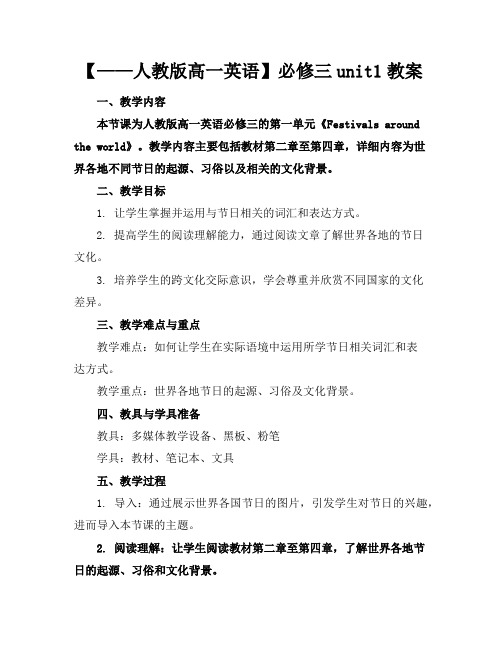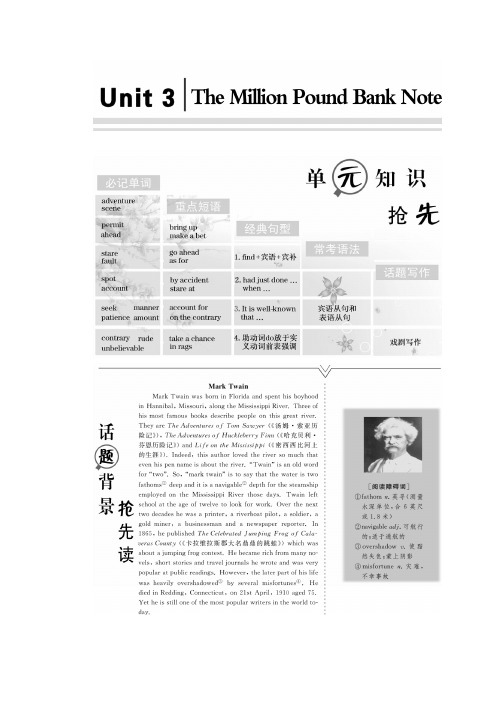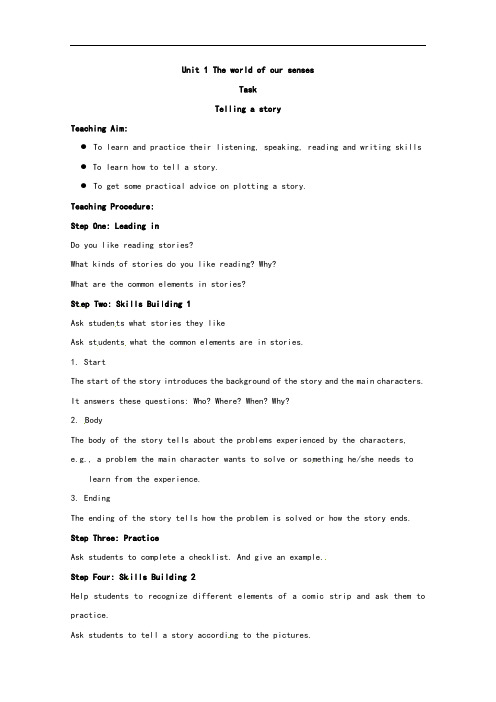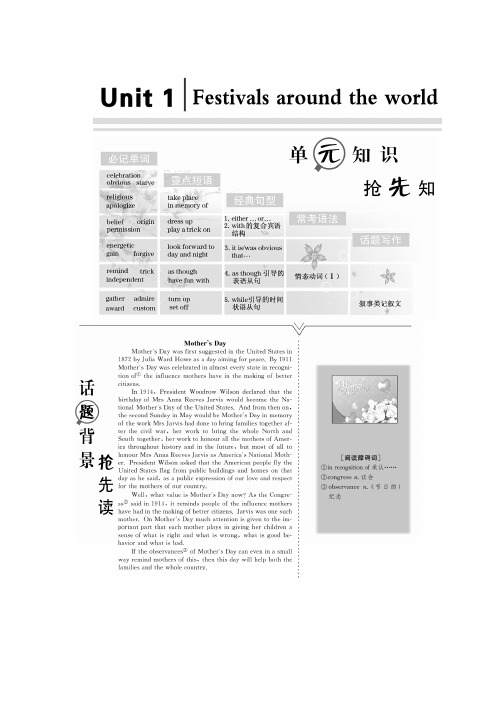2018高中英语人教版必修三教学案:Unit 1 Section 3 Word版含答案
- 格式:doc
- 大小:256.50 KB
- 文档页数:8

Unit 1 Festivals around the world1.Teaching aims of this unitTalk about festivals and celebrationsTalk about the ways to express request and thanksLearn to use Modal verbsWrite a similar story with a different ending2.Sentence patterns:Request:Coul d/ Would you please…?Could I have…?Could we look at…?I look forward to…May I see…?Thanks:It‟s very kind of you…Thank you very much/ Thanks a lot.I‟d love to.It was a pleasure…Don‟t mention it.You are most welcome.3.Modal verbs:May might, can could will would shall should must canThe 1st period Speaking1.Teaching aims:Vocabulary: take place, lunar, festival, Army Day, Christmas, dress upPhrases: Would you like … Could I have…?Might I offer help…? May I see…?You should try…Could we like at…?Can you suggest…? We might take…Teaching ProceduresStep I Leading inT: Hello, everybody! Welcome back to school! Did you have a good time in your winter holidays?Ss. Yes. Of course!T: When did you feel most happy and excited?Ss: At the Spring Festival.T: Who can tell us why? Any volunteers?S1: Because it is the most important festival in our country.S2: Because I got a lot of lucky money from my parents.S3: Because I needn‟t study at festivals and the re was a lot of delicious food to eat.How great.S4: Because I met my cousins and friends who I hadn‟t seen for a long time.T. Very food! I am glad to hear that. Today we will talk about festivals, which are meant to celebrate important events. Please think about some other festivals. Can you name just a few?Ss: New year, Yuan xiao festival…:T: Quite right. That‟s called the Lantern‟s Festival. How about some other festivals?Ss: The Army Day, International Labour‟s Day, National Day, Tomb Sweeping Festival, Dragon Boat Festival, Mid-autumn Day…T: You have done a good job, boys and girls! .Step ⅡWarming –upFestivals are meant to celebrate important events. Different countries have different festivals. Work in groups and lost five Chinese festivals that you know.Discuss when they take place, what they celebrate and one thing that people do at that time. The first one is given to you as an example.Festivals Time of year/date What does itcelebrateWhat do people doMid-Autumn Festival Autumn/Fall The beauty of thefull moon, harvest,time with familyand friendsGive/Eatmooncakes andwatch the fullmoon with familyand friendsStep ⅢPre- readingDiscuss in groups of four1.What‟s your favourite holiday of the year? Why?2.What festivals or celebrations do you enjoy in your city or town? Do you likespending festivals with your family or with friends? What part of a festival do you like best---the music, the things to see, the visits or the food?Step ⅣAssignment1.Consolidation2.Listening to the material again after class to be familiar with it.3.Homework: Collect as much information about festivals as possible.The 2nd period ReadingTeaching Aims1.Vocabulary: starve, starvation, plenty, satisfy ancestor lamps lead feast bone originin memory of dress up trick poet arrival national gain independencegather agricultural European custom awards watermelon handsomerooster admire look forward to religious as though have fun with daily 2.To enable the students to know the earliest festivals with reasons for them and four different kinds of festivals that occur in most parts of the world3.To enable the students to master some English expressions and phrases about festivals.4.Teach the basic reading skills: skimming and scanning.5.Try to compare and make conclusion s of different festivals.Step ⅠRevision1.Greetings.2.Review the new words of this part.3.Check the students‟ homework---festivalsStep ⅡReading1.ScanningT: Open your books and turn to page one. I‟d like you to do the scanning. Read the text quickly and accurately to get the main idea and answer the 6 questions on Page3. ( Ask the student to look through the questions and then read the text silently.)( Four minutes later, check the answers with the whole class. Show the suggested answers on the screen.)2.Intensive reading( Allow the students to read aloud and carefully this time to understand the main ideas of each paragraph and the important details)T: Read the text loudly for a second time and them try to tell if these sentences are True or False.1. The ancient people needn‟t worry about their food. ( F )2.Halloween used to be a festival intended to honor the dead. ( T )3.Qu Yuan was a great poet who people honor a lot in China. ( T )4.Mid-autumn Festival is held to celebrate the end ot autumn( F )5.Easter celebrates the birth of Jesus. ( F )3.Reading and discussionT: Read the text a third time and then work impairs to do Exercise 2 on Page 3.( Let the students have enough time to read the passage carefully and discuss the chart with their partners. Encourage them to expand their answers according to their own experiences.)4.Explanation(In this part try to help the students analyse the difficult, long and complex sentences and guess the meaning of the new words; ask them to deal with the language points in the context.)T: Now I will discuss some important sentences and phrases in the passage.a.Some festivals are held to honor the dead, or satisfy and please the ancestors,who could return either to help or to do harm.b.In memory ofc.In India there is a national festival on October 2 to honor Mahatma Gandhi,the leader who helped gain In dia‟s independence from Britain.d.People are grateful because their food is gathered for the winter, and becausea season of agricultural work is over.e.The most energetic and important festivals are the ones that look forward tothe end of winter and to the coming of spring.f.The country is covered with cherry flowers so that it looks as though it mightbe covered with pink snow.The suggested explanation:a.An attributive clause.The sentence means people hold some festivals either to show respect to the dead or to make their ancestors happy in case they might come back to do harm.b.in memory of … serving to recall sb, to keep him fresh in people‟ minds.He wrote a poem in memory of his dearest wife, who died in an accident.in honor of ( showing great respect or high public regard)in hopes/the hope of (hoping)in defence of (defending)c. a noun phrase followed by an attributive clause as the appositived.two clauses for reasone.energy→energetic adj. ( full of or done with energy)look forward to ( to is a preposition here.)devote to, be/get used to, get down to , stick toe.g. I‟m looking forward to hearing from you.Step ⅢListeningT: Now I will play the tape for you. You can just listen with your books closed or look at your books or read in a low voice together with the tape. It‟s up to you. After listening, please write down three things that most festivals seem to have incommon.( Comprehending Ex.3 on Page 3).The 3rd period Learning about language Teaching aims:1.Let the students know the usage of modal verbs.2.Enable the students to recognize the words and expressions in the reading passageaccording to what mean the same as them.Step ⅠGreeting and Revision( Ask some students to retell the text we learned .)StepⅡ. Practicing the useful words and expressionsT: As we know, there are two important kinds of verbs---transitive verbs and intransitive verbs. But many intransitive verbs have the structure “verb+preposition+objects ” Can you give me some examples?Ss: Sure. Such as look at the picture, hear from my friends, listen to the radio and so on.T: Ok. Now turn to page 4, Ex. 4. You are to make some sentences of your own, using the words given.S1. I‟m looking forward to hearing form my friendS2: We are talking about verbs.S3: Would you like to talk with me?S4: Who can think of an effective solution to the problem?S5: Please think about my proposal.Step ⅢUseful StructuresT: Let‟s come to the next part. This part is about modal verbs. You are to read the sentences in Ex. 1 and then to find out and write down different sentences with modal verbs form the reading passage and try to explain their meanings. If you have any difficulty in understanding them you can refer to Grammar in Pages 92---94Step ⅣSumming up and home workT: Boys and girls, today we have practiced useful words and phrases of this unit and the usage of modal verbs. I think it is not easy for you to master them, after class you should review them.Homework1.Practice of WBP42EX.1,2,3.2.Please find out10 sentences with modal verbs, and try to get their meanings.The 4th period Grammar一、目标与要求1、学习一般现在时态和现在进行时态。

【——人教版高一英语】必修三unit1教案一、教学内容本节课为人教版高一英语必修三的第一单元《Festivals around the world》。
教学内容主要包括教材第二章至第四章,详细内容为世界各地不同节日的起源、习俗以及相关的文化背景。
二、教学目标1. 让学生掌握并运用与节日相关的词汇和表达方式。
2. 提高学生的阅读理解能力,通过阅读文章了解世界各地的节日文化。
3. 培养学生的跨文化交际意识,学会尊重并欣赏不同国家的文化差异。
三、教学难点与重点教学难点:如何让学生在实际语境中运用所学节日相关词汇和表达方式。
教学重点:世界各地节日的起源、习俗及文化背景。
四、教具与学具准备教具:多媒体教学设备、黑板、粉笔学具:教材、笔记本、文具五、教学过程1. 导入:通过展示世界各国节日的图片,引发学生对节日的兴趣,进而导入本节课的主题。
2. 阅读理解:让学生阅读教材第二章至第四章,了解世界各地节日的起源、习俗和文化背景。
3. 词汇讲解:针对阅读文章中出现的关键词汇和表达方式,进行详细讲解。
4. 实践情景引入:设置不同的场景,让学生运用所学词汇和表达方式进行角色扮演。
5. 例题讲解:针对本节课的重点内容,设计相关习题,并进行讲解。
6. 随堂练习:让学生进行小组讨论,完成教材中的练习题。
六、板书设计1. Festivals around the world2. 主要节日及文化背景3. 重点词汇和表达方式七、作业设计1. 作业题目:Write a short essay about your favorite festival and introduce its origin, customs and cultural background.2. 答案要求:不少于100词,要求条理清晰,表达准确。
八、课后反思及拓展延伸1. 反思:关注学生在课堂上的参与度,了解他们在学习过程中的困惑,及时调整教学方法。
2. 拓展延伸:鼓励学生课下搜集更多关于世界各地的节日信息,了解不同文化,提高跨文化交际能力。

Ⅰ.Match the word with its meaning.1.birthplace A.小说2.novel B.信封3.adventure C.出生地4.author D.奇遇;冒险5.scene E.探索;寻求6.wander F.著者;作家7.permit G.耐性;忍耐8.fault H.漫游;漫步;漂泊9.spot I.过错;缺点;故障10.seek J.发现;认出;斑点11.patience K.许可;允许;通行证;执照12.envelope L.(戏剧)一场;现场;场面;景色答案:1~5CADFL6~10HKIJE11~12GBⅡ.Write down the meaning of phrases in each sentence.1.The Smiths are praised for the way they bring up their children.抚养2.Go ahead for two blocks, then turn left.前进3.I found the key by accident when I was cleaning the room.偶然4.In the West people think it's rude to stare at a person.盯着看5.Good luck accounts for her being famous overnight.解释6.It doesn't seem ugly to me; on the contrary, I think it's rather beautiful.相反Do you know something about Mark Twain's stories? Match the following pictures to the names of his stories.1.Running for Go v ernor________2.《汤姆·索亚历险记》________3.The Million Pound Bank Note________4.《哈克贝利·费恩历险记》________5.Boat in Venice________答案:1~5ADEBCⅠ.Fast-reading1.Put the following events in correct order.①Henry wandered in London streets.②About a month ago Henry Adams was sailing out of the bay.③The next morning he was spotted by a ship.④Towards nightfall he found himself carried out to sea by a strong wind.⑤On the ship he earned his passage by working as an unpaid hand.答案:②④③⑤①2.What's the main idea of the passage?A.Two rich gentlemen made a bet on a million pound bank note. B.How did Henry Adams land in London?C.Henry Adams was puzzled about the note.D.Why did the two rich gentlemen choose Henry Adams?答案:AⅡ.Careful-readingRead the text carefully and choose the best answer.1.Henry landed in Britain ________.A.because he planned to earn a living thereB.because he lost his own shipC.by accidentD.because he wanted to wander in London2.What happened to Henry when he was sailing out of the bay?A.His boat sank in a storm at sea.B.He was carried out to sea by a strong wind.C.He was attacked by some bad men at sea.D.He jumped into the sea to kill himself.3.Which of the following words can best describe Henry?A.Brave.B.Honest.C.Lazy. D.Shy.4.Which of the following is TRUE?A.Henry opened the letter before 2 o'clock.B.The two brothers would like to offer him a job.C.Roderick believed that with a million pound bank note a man could survive a month.D.Henry only wanted a job because he was penniless in London.5.How did Henry feel when the two brothers gave him the letter?A.Unhappy. B.Surprised.C.Pleased. D.Excited.答案:1~5CBBDAⅢ.Study-readingAnalyze the following difficult sentences in the text.1.It is Henry Adams, an American businessman, who is lost in London and does not know what he should do.[句式分析][尝试翻译]他叫亨利·亚当斯,是一个美国商人。

【——人教版高一英语】必修三unit1教案一、教学内容本节课选自人教版高一英语必修三的Unit 1,主题为“Festivals around the world”。
具体内容包括:Reading and Writing部分,介绍世界各地不同节日及其庆祝方式;Grammar部分,讲解一般过去时的用法;Listening and Speaking部分,练习谈论节日的相关表达;以及Additional Exercises部分,巩固所学知识。
二、教学目标1. 了解世界各地的主要节日及其庆祝方式,培养学生的跨文化交际意识。
2. 掌握一般过去时的用法,能正确运用该时态描述过去的动作或事件。
3. 提高学生的听说能力,使他们能够熟练运用所学表达谈论节日。
三、教学难点与重点重点:世界各地节日的介绍、一般过去时的用法、节日相关表达的听说练习。
难点:一般过去时的正确运用,以及如何用英语描述节日习俗。
四、教具与学具准备1. 教师准备:多媒体设备、PPT、黑板、教材。
2. 学生准备:教材、笔记本、彩色笔。
五、教学过程1. 导入:通过播放一段关于世界各地的节日视频,激发学生的兴趣,引入本节课的主题。
2. 阅读与写作:a. 让学生快速浏览课文,了解世界各地的主要节日。
c. 指导学生进行写作练习,用一般过去时描述自己最喜欢的节日。
3. 语法讲解:通过例句和练习,让学生掌握一般过去时的用法。
4. 听力与口语:a. 播放听力材料,让学生回答关于节日的问题。
b. 学生两人一组,进行节日话题的口语练习。
5. 巩固练习:完成Additional Exercises部分,检查学生对本节课知识的掌握。
六、板书设计1. Festivals around the world2. 内容:a. 世界各地节日及庆祝方式b. 一般过去时的用法c. 节日相关表达七、作业设计1. 作业题目:a. 根据课文内容,用一般过去时描述一个你了解的节日。
b. 收集更多关于节日的资料,与同学分享。

Unit 1 The world of our sensesTaskTelling a storyTeaching Aim:●To learn and practice their listening, speaking, reading and writing skills ● To learn how to tell a story.●To get some practical advice on plotting a story.Teaching Procedure:Step One: Leading inDo you like reading stories?What kinds of stories do you like reading? Why?What are the common elements in stories?St ep Two: Skills Building 1Ask studen ts what stories they likeAsk st udents what the common elements are in stories.1. StartThe start of the story introduces the background of the story and the main characters. It answers these questions: Who? Where? When? Why?2. BodyThe body of the story tells about the problems experienced by the characters, e.g., a problem the main character wants to solve or so mething he/she needs to learn from the experience.3. EndingThe ending of the story tells how the problem is solved or how the story ends. Step Three: PracticeAsk students to complete a checklist. And give an example.Step Four: Sk ills Building 2Help students to recognize different elements of a comic strip and ask them to practice.Ask students to tell a story accordi ng to the pictures.。

Ⅰ.Match the word with its meaning.1.gain A.农业;农学2.feast B.独立;自主3.starve C.节日;盛宴4.origin D.获得;得到5.belief E.收获;收割6.arrival F.奖品;授予7.gather G.习惯;风俗8.award H.赞美;钦佩9.admire I.(使)饿死;饿得要死10.custom J.搜集;集合;聚集11.harvest K.到来;到达;到达者12.religious L.起源;由来;起因13.energetic M.信任;信心;信仰14.independence N.宗教上的;信奉宗教的;虔诚的15.agriculture O.充满活力的;精力充沛的;积极的答案:1~5DCILM6~10KJFHG11~15ENOBAⅡ.Write down the meaning of phrases in each sentence.1.The 2016 Olympic Games took place in Rio de Janeiro, Brazil.发生;举行2.They will build a monument in memory of the national hero.为了纪念3.Her sister helped her to dress up for the party.打扮4.If the children do not get any sweets, they might play a trick on the neighbour.搞恶作剧5.We have been looking forward to meeting the famous actor some day.期待6.The PLA (中国人民解放军) men defend our great motherland day and night.日夜7.He completely ignored all these facts as though they never existed.好像8.Did you have fun with Uncle Joey today?玩得开心。
人教版英语必修3 Unit1-5 全套教案Unit 1 Festivals around the worldTeaching aims and demands1.topic: 1>Festivals2> how festivals begin3>how to celebrate festivals2.function: 1>RequestEg: Could you please…?Could I have …?I look forward to doing…2>ThanksEg: It’s a pleasure. /Don’t mention it.It’s very kind of you to…I’d love to …Thank you very much./Thanks a lot.You are most welcome.3.vocabulary:4.grammar: 情态动词的用法Jin can speak English well. (ability)Could you please show me the way to …? (request)May we see the awards for the team? (permission)She might give you … (possibility)The whole family will come for dinner. (promise)Often he would dress up like a rich man. (pass habit)We would be there with our friends. (promise)II.Key pointsPeriod 1 Warming up and fast reading1.Greetings2.Warming upStep 1 discussing the following questionsa.How was your holiday/spring festival?b.Did you go traveling?c.How much pocket money did you get?Step 2 talking1). Name some festivalsSpring Festival Dragon Boat Festival Lantam Festival Mid-Autumn FestivalArmy Day May Day Teachers’ DayNew Year National Day Mother’s DayChildren’s Day Father’s DayChristmas Day Halloween carnivalEaster Valentine Day Oben2).Ss work in groups of four and list five Chinese festivals and siscuss when they take place , what they celevrate and one thing that people do at that time. Then fill in the blanks.Festivals Time of year/date Celebrate for Things to doMid-Autumn DaySpring FestivalDragon Boat DayTomb sweeping DayLantern Festival3.Pre-reading1) What’s your favourite holiday of the year? Why?2) What festivals or celebration do you enjoy in your city or town? Do you like spending festivals with your family or with friends? What part of a festival do you like best—the music, the things to see, the visits or the food?4. Fast reading and find the answers to the following questions.A.What did ancient festivals celebrate?B.What are festivals of the dead for ?C.Why are autumn festivals happy events ? three things people do at spring festival ?Period 2-3 Intensive reading1.Read the passage paragraph by paragraph and find the main ideas of each paragraphParagraph 1: All kinds of celebration in ancient time.Paragraph 2: The purpose to honour the dead and three examplesFestivals Time Things people doObenDay of the DeadHalloweenParagraph 3: The reasons Why we honour peopleFestivals Who does it celebrate ?Dragon Boat FestivalsClumbus DayIndian National FestivalParagraph 4: Autumn festivals are happy eventsParagraph 5: How people celebrate in spring festivals2.Language pointsa.They would starve if food was difficult to find…starve (v.)饿死;挨饿eg. Millions of people starved to death during the war.Starve for sth 渴望…Eg. The homeless children starve for love.Starvation (n.) 饿死Eg. Die of starvationStarvation wages 不够维持基本生活的工资b.The most ancient festivals would celebrate the end of the cold weather, planting in spring and harvest in autumn.Celebrate (vt./vi.) 庆祝,赞颂,赞美,举行(仪式)Eg.We celebrate the new year with a party.Their courage was celebrated in all the newspaper.Celebrated (adj.) = famous 著名的,驰名的c. …because they thought these festivals would bring a year of plenty.days/years/…of plenty :富裕(尤指事物和钱)的日子,年月,生活等。
【——人教版高一英语】必修三unit1教案【教案】一、教学内容人教版高一英语必修三Unit 1《Festivals around the world》。
该单元主要介绍世界各地的节日,包括西方的圣诞节、复活节等,以及东方的春节、中秋节等。
通过学习,学生能够掌握相关的词汇和表达方式,了解不同文化的节日习俗,提高跨文化交际的能力。
二、教学目标1. 学生能够熟练掌握本单元的生词和短语,正确使用动词过去式描述过去发生的事情。
2. 学生能够听懂、会说、会读、会写关于节日的故事,能够用英语介绍自己喜欢的节日。
3. 学生能够通过阅读和听力材料,了解不同国家的节日习俗,提高文化意识。
三、教学难点与重点重点:1. 掌握动词过去式的正确用法。
2. 能够用英语介绍自己喜欢的节日。
难点:1. 理解和运用本单元的生词和短语。
2. 正确使用动词过去式描述过去发生的事情。
3. 了解不同国家的节日习俗,提高文化意识。
四、教具与学具准备教具:多媒体课件、录音机、磁带或光盘、黑板、粉笔。
学具:课本、练习册、录音机、磁带或光盘、笔记本。
五、教学过程1. 情景引入(5分钟)教师通过向学生提问:“你们最喜欢的节日是什么?为什么?”来引出本课的主题。
学生可以自由发言,分享自己喜欢的节日和原因。
教师引导学生用英语进行表达,同时板书关键词“festival”和“celebrate”。
2. 课堂讲解(15分钟)教师带领学生学习本课的生词和短语,如“Christmas”、“Easter”、“Spring Festival”等,并通过例句解释其用法。
接着,教师讲解动词过去式的正确用法,并通过练习题让学生进行随堂练习。
3. 听力训练(10分钟)教师播放课文中的听力材料,学生边听边做练习。
听力材料内容包括不同国家的节日习俗。
听后,教师提问学生关于听力材料的问题,检查学生对听力内容的理解。
4. 阅读理解(10分钟)教师分发课文阅读材料,学生独立阅读,并回答相关问题。
Unit 2 Healthy EatingI.教学内容分析本单元的中心话题是健康饮食。
主要是为了使学生对与健康有关的问题得到更好的理解。
这一单元鼓励学生去检查自己的饮食行为,看一看它是不是健康的饮食习惯.一种健康的饮食习惯应该是平衡的,既不在脂肪、糖和盐这些方面过剩,又不会在人体必需的营养元素方面匮乏。
通过本单元的学习,学生可以对健康饮食有一个清楚的概念,从而根据所学的知识去思考与健康有关的问题。
Warming Up部分通过问题向学生询问饮食构成,让学生对本单元的内容能有一个初步的了解,并使学生复习与有关饮食的单词和短语。
然后让学生回答一组问题,通过这些问题的讨论,引导学生参与表达自己的看法,激发学生兴趣和好奇心,让学生自然而然地进入下一部分的学习.Pre—reading部分通过几个问题讨论,让学生认识平衡营养的重要性,为课文的学习做出铺垫。
Reading 部分主要讲述了王鹏和咏慧开饭店的故事,借此揭示了不同食物对人体有着不同的影响。
故事讲诉了王鹏和咏慧两家饭店的两种饮食都是不合理的,经常去王鹏的饭店容易发胖,这样会导致高血压和心脏病等疾病;而经常去咏慧的饭店的顾客则容易变瘦,这样容易导致厌食或是营养不良,让学生注意并避免走这两种极端。
这些距离学生自身生活很接近的问题很容易引起学生的思考.在教授的过程中注意积极的引导学生不断的进行反思。
Comprehending第一部分通过True or False 第四部分通过Main idea 的寻找,使学生对文章有了一个浅层的理解.Learning about Language部分突出了词汇和语法的学习与训练。
本单元的语法是情态动词ought to等的基本用法。
Using Language部分中包括了听、说、读、写几个部分的内容。
学生可通过王鹏和咏慧的这一个事情,深入展开讨论与健康饮食有关的事情。
阅读后的习题及讨论不仅帮助学生加深对文章主旨大意的理解,更重要的是让学生学会用所学的知识,解决在现实生活中遇到的问题。
教学过程一、课堂导入要求学生以小组形式完成一个表格填充,列出中国的五个节日和这些节日的时间、庆祝的内容以及节日里人们的所作所为。
激发学生的阅读兴趣,为本单元Reading部分的世界节日做好铺垫。
二、复习预习以提问学生方式复习上节课所学习知识。
同时以习题形式预习新课。
三、知识讲解考点/易错点1 重点单词与短语学习mean n.意义,意思v. 意味;想要(回归课本P1)Festivals are meant to celebrate important times of year.[归纳拓展]mean to do 打算做某事be meant to do 被要求做…mean doing 意味着….eg. I never meant him to work for us.Passing the entrance examination means being admitted into college.take place发生(回归课本P1)Discuss when they take place, what they celebrate and what people do at that time. [归纳拓展] take place/happen/occur/break out/come about(1)take place 其“发生”是按意图或计划进行,无偶然性,无被动语态。
(2)happen “发生”,常指具体客观事物或情况的发生,含有“偶然”的意味。
当以具体事物、事件作主语时,happen 和occur 可以换用;但当happen用作“碰巧”之意时,不能用occur代替,但可以与come about 互换。
用法是happen to do sth.,无被动语态。
(3)occur发生,出现, 较正式用语,可指事情偶然地、意外地发生或思想突然浮在心头。
occur to 有“想起”的意思。
指具体事物时可与happen互换(但happen to do不可换成occur to do);另外occur 有“突然想起”的意思,此时不可与happen 互换,如A good idea occurred to him.(4)break out (战争、火灾等)爆发;(疾病)突然发生。
[语法初识]
[语法剖析]
The idea that computers can recognize human voices surprises many people.
电脑能识别人的声音,这种想法使很多人感到吃惊。
They must be in the classroom.
他们一定在教室里。
2.情态动词一般无人称和数的变化,个别情态动词有现在时和过去时两种时态变化。
Mary can speak three languages.
玛丽会说三种语言。
I could drive a car before I left school.
毕业前我就会开车。
3.构成否定句时,not放在其后面。
My brother can't swim.
我弟弟不会游泳。
4.情态动词后接动词原形。
You will do as I told you.
你得照我说的去做。
He might come tomorrow, but I am not quite sure.
他可能明天来,但我拿不准。
即时演练1
单句改错
①We should to study hard for our motherland and ourselves.去掉to
②She can sings that song in English. sings→sing
③This book doesn't must be removed from the library.doesn't_must→mustn't
(1)表示能力:can用来表示现在的能力,could表示过去的能力。
I can play basketball now, but I couldn't when I was young.
现在我会打篮球了,但小时候我不会。
(2)表示请求和许可:could语气比can委婉,但回答时只能用can。
—Could you show me the way?
—Yes, I can.
——你能否告诉我怎么去?
——可以的(没问题)。
(3)表示推测,意为“可能”。
多用于否定句或疑问句。
That can't be Mary — she's in hospital.
那不可能是玛丽——她在住院。
(4)表示理论上或习惯上的可能性,意为“可能会”。
Scotland can be very warm in September.
九月的苏格兰可能会非常暖和。
[辨析]
I。